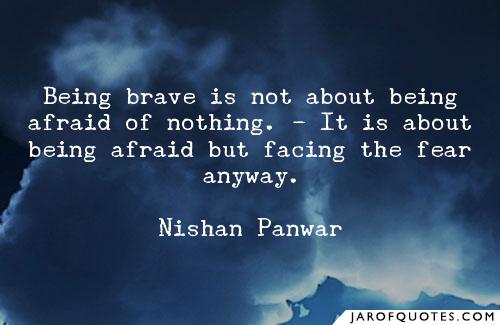|
12/3/2020 0 Comments FEAR & COURAGEFear /fɪə/ noun An unpleasant emotion caused by the threat of danger, pain, or harm. Courage /ˈkʌrɪdʒ/ noun The ability to do something that frightens one; bravery. Fear of loss. Fear of danger. Fear of failure. Fear of death. We all experience different levels of fear at various points in our lives. Sometimes, it’s more dramatic and comes from an element of surprise, for instance if you ever walk through a wild forest and are faced by a tiger. According to WWF (World Wildlife Fund... not the wrestling federation), there were approximately 3,900 tigers left in the world in 2019. So, the reality of that kind of fear is very small. More realistically, when we travel to a new country, we should be more afraid of humans, than animals. The fear of being robbed or attacked in Caracas, Venezuela is more rational. Regarded as the second most dangerous city in the world, Caracas has a murder rate of 111.2 deaths per 100,000 people (World Population Review, 2019). However, statistics can always be interpreted. Just because South Africa is the fifteenth most dangerous country in the world, with sixty-two deaths per 100,000 people every year, this hasn’t stopped the tourist trade which continues to thrive and have positive reviews. Other types of fear involve illnesses and its impact on us and loved ones, and with the latest constant media coverage of the pandemic from the coronavirus (COVID-19), this is a constant battle of managing fear. WHAT IF THINGS GO WRONG?If we are unfortunate enough to be faced with unforeseen circumstances, we need to have some easy-to-access tools or ideas up our sleeves. For instance, when I was visiting Antigua in Guatemala, we heard about people on motorbikes snatching bags and, on some occasions, attacking their victims. In Buenos Aires, Argentina, there was a trend of people smearing a smelly, unidentifiable brown paste on tourists’ clothes as a form of distraction. While you would try to clean up, they could grab your bag and run away. When we face danger, whether it’s a contagious illness, a hungry tiger or a mugger, our bodies and minds can react in many ways, one of which is called a ‘Fight-or-Flight’ response. Walter Bradford Cannon (1871–1945), a well-known American physiologist, first described 'Fight-or-Flight' as a physiological reaction that occurs in response to a perceived threat. Different approaches exist to deal with the response our bodies make before our minds can process things. Here are some tried and tested tips:
DEALING WITH TRAUMAIf you have already experienced something unpleasant on your trip or in life, you need to ensure you don’t let that ruin the rest of your holiday or travel plans... or life. According to helpguide.org, here are some ways to deal with a shock or trauma:
This is not an exhaustive list of solutions but is hopefully a good reminder of how we can take care of ourselves during difficult times, whether at home, when travelling alone, or in groups or just while getting on with life. What moves us forward is the ability to build up courage to understand and address, rather than fight, that fear. You gain strength, courage, and confidence by every experience in which you stop to look fear in the face.
0 Comments
|
Home |
Categories |
|

 RSS Feed
RSS Feed